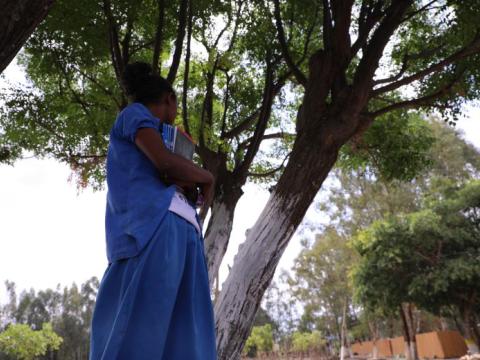Empowering Girls to Stand For One Another And Fight Inequality

“If we do not stand up for our sisters, who would? If their suffering is nothing to us, we cannot see the line distinguishing us from the perpetrators. We have to be a voice for the voiceless. We have to work together,” Mekdes, 15, passionately talks about the problems girls in her community face and what she and her Girls’ Club friends are attempting to do.
Being female in a developing country comes with many challenges that range from wrong perceptions to life-threatening ones. Mekdes, a grade eight student, is the Deputy Head of the Girls’ Club in the school. She joined the club when she was a grade six student. Mathematics is her favourite subject because, she says, it helps her to think. “Girls have countless challenges to struggle with. If we want to prevail, we must be strong in our education and keep working hard,” Mekdes explains, explaining what keeps her awake at night. The Girls’ Club at the school was established to cultivate sisterhood among girls and engage all students in the struggle against unfair treatment girls endure in the community and beyond.
The Girls’ Club works to end the shame and discrimination attached to anything about being female. They also work on ending outdated traditions ranging from catcalling to child marriage in their community. They recalled one significant achievement in 2023. They helped to stop the plan of child marriage involving Konjit*, who is 15 years old and a grade 8 student. Against her will, she was proposed to be married, and her family happily accepted the proposal and was ready to give her away to a much older man. She explains that the pain is still fresh, remembering how her family was all ready for the party, preparing food and drinks. She says, “When I asked about the preparation, they said it was for a religious ceremony. Little did I know that it was for my wedding.” This was the second time Konjit was forced into marriage. She states that she has been prepared for marriage since she was 13.
The first time it happened, she was a sixth-grade student. She was just a kid who loved playing outside with her friends. She says, “I said no, and I cried for weeks, hoping they would change their mind. They let me cry, saying it was normal for girls to cry before getting married.” She was saved by her aunt, who decided to help her relocate to the capital, Addis Ababa, and escape the marriage. As a result, she was forced to drop out of school.
This time around, she knew about the Girls Club at her school and their function. She decided to sit with her parents and tell them about her wish before communicating with the Girls Club. “When I told them that I am a child and I want to continue my education, They came up with the age-old technique of promising that I would continue my education even after marriage. They wanted to get rid of poverty by marrying me into a rich family. It was purely an economic decision. My feelings, my future, my dream, my education, and my health mattered little to them,” Konjit says. She wanted to go to the police, but guards were assigned to follow her movements, even in the school. That was why she then decided to confide in her friends to tip the Girls Club.
Mekdes, the Deputy Head of the Girls’ Club, was shocked when she first received the tip from other students. She then immediately let her teachers know, who then alerted the police. The police then took swift action to stop the marriage and keep Konjit safe from the angry family and groom. Mekdes says, “We were so happy that she wanted to continue her education and was against the proposed marriage. This was my proudest achievement. This is exactly the meaning of sisterhood. I am my sister’s keeper."
World Vision empowered the Girls’ Club by providing training and material support. Teachers were also part of the training. It also constructed a menstrual hygiene management room in the school to make the girls' club's work much easier.
Both Mekdes and Konjit wish to be doctors. Thanks to the Girls’ Club, Konjit is happy now that her parents have agreed to accept her request. The Girls’ Club, strengthened by World Vision’s support, empowered 372 female students in the school.
*The name has been changed, and the location has not been mentioned to protect the identity.
By Tesfagebriel Tekola, Communication Coordinator, World Vision Ethiopia